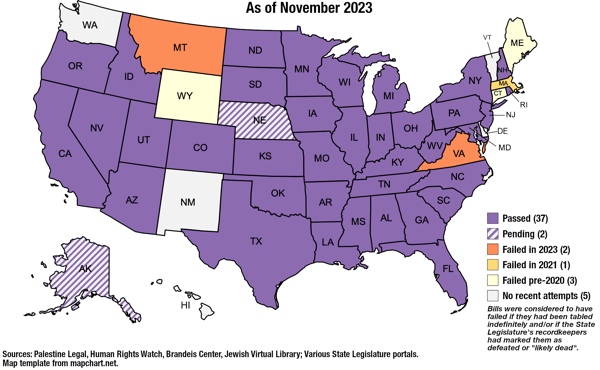- cross-posted to:
- world@lemmy.world
- cross-posted to:
- world@lemmy.world
To echo some other comments, it seems like this article proves that boycotting is in fact one of the only ways to hold companies accountable. That’s why so many states in the US have passed laws making BDS (Boycott, Divestment, Sanctions) illegal when it comes to Israel.

These laws don’t make BDS illegal, they make it so that businesses who contract with the state must not engage in BDS. This is a common tactic (usually employed by the left) to push business to do what they want, often when a law requiring it would be unconstitutional.
An example of this is preferential contracting to businesses owned by poc.
Also, I’d argue that the popularity of these anti-BSD measures have nothing to do with their effectiveness.
(usually employed by the left)
Looks to be pretty bipartisan to me.
As of 2024, 38 states have passed bills and executive orders designed to discourage boycotts of Israel.[6] Many of them have been passed with broad bipartisan support.[7] Most anti-BDS laws have taken one of two forms: contract-focused laws requiring government contractors to promise that they are not boycotting Israel; and investment-focused laws, mandating public investment funds to avoid entities boycotting Israel.[8] Separately, the U.S. Congress has considered anti-boycott legislation in reaction to the BDS movement. The U.S. Senate passed S.1, which contained anti-boycott provisions, on January 28, 2019, by a vote of 74–19. The U.S. House passed a resolution condemning the boycott of Israel on July 24, 2019, by a vote of 398–17. Senators Marco Rubio (R-FL), Bill Cassidy (R-LA), Mike Braun (R-IN), Rick Scott (R-FL), Bill Hagerty (R-TN), and Steve Daines (R-MT) reintroduced the Combating BDS Act of 2023. So far, no federal law has been adopted.[6]
I appreciate the clarification on how these laws work. I think you’re right that their popularity doesn’t necessarily imply effectiveness, it probably has more to do with the impulse to join in the virtue-signaling. But their popularity does send a strong message that how people and companies spend their money is important, and I’d argue that means they must be at least a little bit effective.
And the laws are wildly unpopular with the American people, but were still passed in the majority of states, which also tells me they must be doing something:
a majority of Americans oppose anti-BDS laws; 72% opposed laws penalizing people who boycott Israel and 22% supported such laws. Source
As always, theres also the French way which is much more direct.
…so, the other way is boycotting? Seriously though, correct me if I’m wrong, but spending your money on the competition sounds like boycotting to me
I reached the same conclusion - it says why the thing doesn’t work, and then suggests you try the thing anyway, with maybe an extra step or two.
Shush listen to the machine now go back to sleep
Boycotts have one advantage over “consistently directing your money to companies in which you are confident”—they can work even if there aren’t any better alternatives. A coordinated campaign to target one company at a time can eventually force a whole industry to change, even if the industry offered no meaningful choices to start with.
BBC News - News Source Context (Click to view Full Report)
Information for BBC News:
MBFC: Left-Center - Credibility: High - Factual Reporting: High - United Kingdom
Wikipedia about this sourceSearch topics on Ground.News
https://www.bbc.com/worklife/article/20240415-product-boycotts-conscious-consumerism




